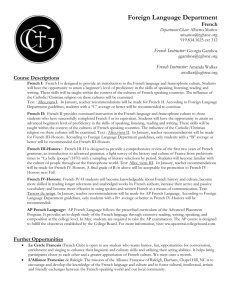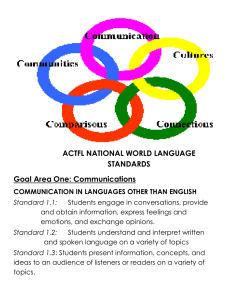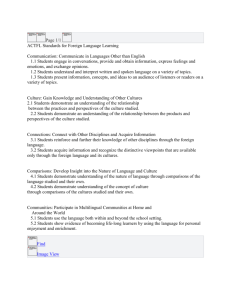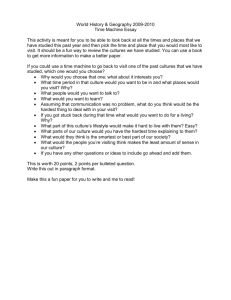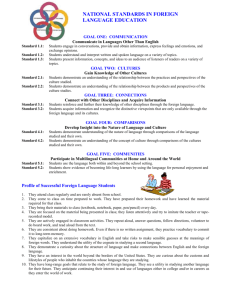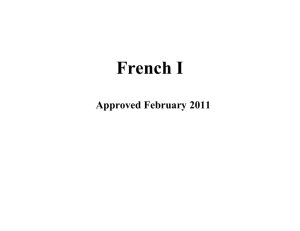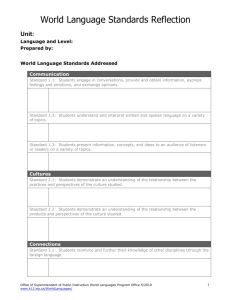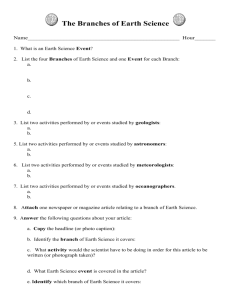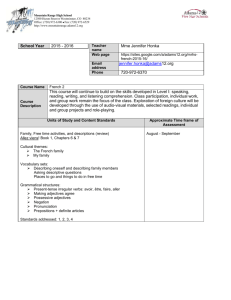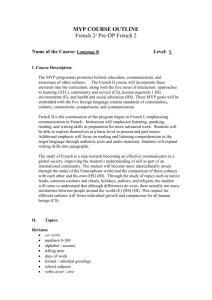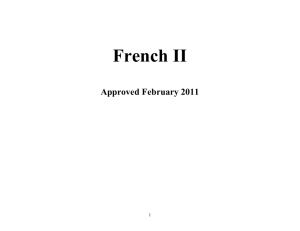French V
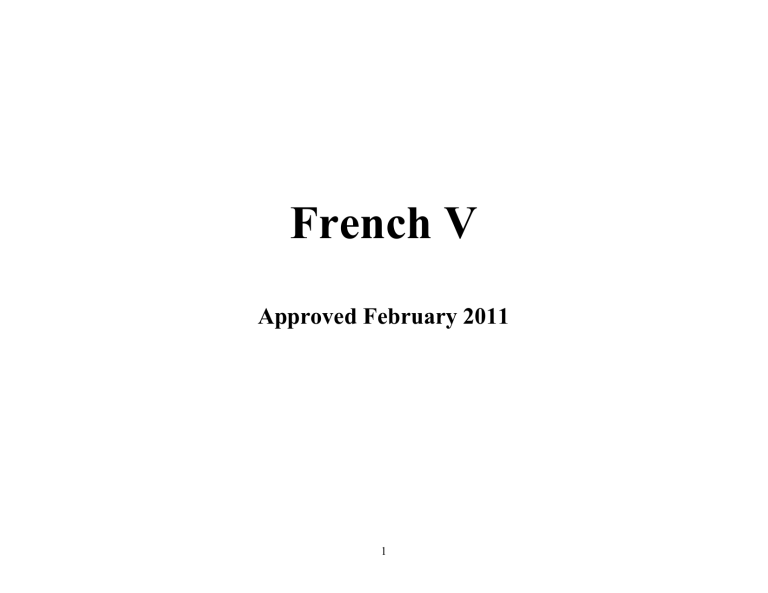
French V
Approved February 2011
1
Unit 1 : La Vie Courante et les Echanges sportifs et culturels
(Daily Life)
Essential Understandings:
1.
Communicate in languages other than English
2.
Gain knowledge and understanding of other cultures
3.
Connect with other disciplines and acquire information
4.
Develop insights into the nature of language and culture
5.
Participate in multilingual communities at home and around the world
Content Standards:
1.1: Students engage in conversations, provide and obtain information, express feelings and emotions, and exchange opinions.
1.2: Students understand and interpret written and spoken language in a variety of topics
1.3: Students present information, concepts, and ideas to an audience of listeners or readers on a variety of topics.
2.1: Students demonstrate an understanding of the relationship between the practices and perspectives of the culture studied.
2.2: Students demonstrate and understanding of the relationship between the products and perspectives of the culture studied.
3.1: Students reinforce and further their knowledge of other disciplines through the foreign language.
3.2: Students acquire information and recognize the distinctive viewpoints that are only available through the foreign language and its cultures.
4.1: Students demonstrate understanding of the nature of language through comparison of the language studied and their own.
4.2: Students demonstrate understanding of the concept of culture through comparisons and the cultures studied and their own.
5.1: Students use the language both within and beyond the school setting.
5.2: Students show evidence of becoming life-long learners by using the language for personal enjoyment and enrichment.
Essential Questions: How do I integrate all of my French knowledge to communicate more naturally?
Learning Goals: Students will:
renew old acquaintances
exchange information
express anticipation (use of adverbial conjunctions in the future)
make suppositions
express certainty (futur)
express doubt (subjonctif)
inquire (expressions interrogatives et pronouns)
express excitement and disappointment
compare and contrast print advertisement in French magazine
read and choose a francophone country to explore
identify sources for accessing information of a francophone country
request information
write a formal letter
2
Suggested Strategies
Suggested Assessments
Suggested Resources
Discovery activity ( Qui a un chat? …)
Communicative activity ( Faisons la Connaissance)
Devinette sheet with irregular verbs (sentences Je, questions Tu, communicating, reporting)
Read, take notes, of current event ( France,Today -magasine)
Answer questions about an article on French culture
Pair communicative activities
Realia cards
Question pair sheet
Situation cards
Circumlocution activities
Homework
Quizzes
Lab and internet assignment
Informal Oral Daily Assessments
Allez, Viens!
Level III Textbook (Holt, Rinehart, Winston)
Allez, Viens!
Cahier d’activités (chapter 12)
Allez, Viens!
Teaching Transparencies
Allez, Viens!
Travaux Pratiques de Grammaire
Allez, Viens!
Activities for Communication
Allez, Viens!
Lesson Planner
Allez, Viens!
TPR Storytelling Book
Allez, Viens!
Alternative Assessment Guide
Allez, Viens!
Reading Strategies and Skills Handbook
Allez, Viens!
Standardized Assessment Tutor
Allez, Viens!
Listening Activities workbook
Allez, Viens!
Video guide workbook
Allez, Viens!
Testing program
Allez, Viens !, Internet
Discovering French (Rouge) (DC Heath) Reprise
Images Reading material
Joie de lire booklets
“Wicked Cool French: What High School French Students Really Want to Learn”
French/English Dictionary
France, Today (magazine)
Le Journal Français d’Amerique
3
Suggested Tech Integration
Content Vocabulary
Lifelong Learning/21 st Century
Skills
Allez, Viens!
DVD Tutor
Allez, Viens!
DVD-Rom set
Allez, Viens!
Audio Compact Discs
www.hrw.com
www.gohrw.com
Holt World Language Software
Classroom requests and terminology
Terminology to make inquiries
Expressions: anticipation, certainty, doubt, excitement & disappointment
Productive Habits of Mind
Quality Work
Read Critically
Communicate Effectively
Collaborate and Cooperate
Access and Process Information
Core Ethical Values
4
Unit 2: L’ART
(Art)
Essential Understandings:
1.
Communicate in languages other than English
2.
Gain knowledge and understanding of other cultures
3.
Connect with other disciplines and acquire information
4.
Develop insights into the nature of language and culture
5.
Participate in multilingual communities at home and around the world
Content Standards:
1.1: Students engage in conversations, provide and obtain information, express feelings and emotions, and exchange opinions.
1.2: Students understand and interpret written and spoken language in a variety of topics
1.3: Students present information, concepts, and ideas to an audience of listeners or readers on a variety of topics.
2.1: Students demonstrate an understanding of the relationship between the practices and perspectives of the culture studied.
2.2: Students demonstrate and understanding of the relationship between the products and perspectives of the culture studied.
3.1: Students reinforce and further their knowledge of other disciplines through the foreign language.
3.2: Students acquire information and recognize the distinctive viewpoints that are only available through the foreign language and its cultures.
4.1: Students demonstrate understanding of the nature of language through comparison of the language studied and their own.
4.2: Students demonstrate understanding of the concept of culture through comparisons and the cultures studied and their own.
5.1: Students use the language both within and beyond the school setting.
5.2: Students show evidence of becoming life-long learners by using the language for personal enjoyment and enrichment.
Essential Question: How do artists express the concept of beauty and in their art?
Learning Goals: Students will:
describe a work of art
identify various works of art and the associatd artist
view a DVD and comprehend the artists’ descriptions
use art terminology to describe a painting and/or sculpture
research an artist, identify his/her style, present their findings
role play a scene in a café d’artiste
understand the concept of impressionisme and en plein air
5
Suggested Strategies
Suggested Assessments
Suggested Resources
Suggested Tech Integration
Deconstructing associated video
Communicative activity ( Jouons aux cartes impressionistes)
Deconstruction of a DVD featuring interviews
Read, take notes, identify art movements and artists
Jumelle activity with artists
Go Fish with artists and their works
Realia cards
Situation cards
Power point presentation
Internet activity with Chicago Art Institute
DVD (Voix du Musée d’Orsay) presentation and worksheets
Field trip to Hillstead Museum
Painting en plein air
Role play café scene; taking on artist’s character
Identify countries that influenced an artist and possible reasons
Homework
Quizzes
Tests
Worksheets
Power point
Lab and internet assignment
Informal Oral Daily Assessments
Role play
Discovering French (Rouge) ( ch. 1)
Internet site: Chicago Institute of Art
Voices from the Orsay (DVD et guide)
Impressionism (DVD series-CRHS library)
Playing cards of artist
French/English Dictionary
Clip art posters
Voix des artistes (DVD)
Internet activities of artist
Microsoft PowerPoint
6
Content Vocabulary
Lifelong Learning/21 st Century
Skills
Art terminology in French
Descriptive and personal terminology
Productive Habits of Mind
Quality Work
Read Critically
Communicate Effectively
Collaborate and Cooperate
Access and Process Information
Core Ethical Values
7
Unit 3: Au Revoir, Les Enfants
(Goodbye, Children)
Essential Understandings:
1.
Communicate in languages other than English
2.
Gain knowledge and understanding of other cultures
3.
Connect with other disciplines and acquire information
4.
Develop insights into the nature of language and culture
5.
Participate in multilingual communities at home and around the world
Content Standards:
1.1: Students engage in conversations, provide and obtain information, express feelings and emotions, and exchange opinions.
1.2: Students understand and interpret written and spoken language in a variety of topics
1.3: Students present information, concepts, and ideas to an audience of listeners or readers on a variety of topics.
2.1: Students demonstrate an understanding of the relationship between the practices and perspectives of the culture studied.
2.2: Students demonstrate and understanding of the relationship between the products and perspectives of the culture studied.
3.1: Students reinforce and further their knowledge of other disciplines through the foreign language.
3.2: Students acquire information and recognize the distinctive viewpoints that are only available through the foreign language and its cultures.
4.1: Students demonstrate understanding of the nature of language through comparison of the language studied and their own.
4.2: Students demonstrate understanding of the concept of culture through comparisons and the cultures studied and their own.
5.1: Students use the language both within and beyond the school setting.
5.2: Students show evidence of becoming life-long learners by using the language for personal enjoyment and enrichment.
Essential Question: How do stereotypes influence your actions and friendships?
Learning Goals: Students will:
Use circumlocution to define precise vocabulary terminology
Identify the main events at the beginning of World War II that led to a divided France
Identify stereotypes and discuss their role in people’s actions
Compare characters in a film
Describe settings in a small village and school
Explain events as they related to a particular character
Express statements of condition (le conditionnel)
Express emotions, possibility and necessity (le subjonctif)
Identify with a certain personality and role play the character
Analyze the principal characters in the film and their relationships
Ask about and summarize a story
Read and analyze the significance of a poem
8
Suggested Strategies
Suggested Assessments
Suggested Resources
Suggested Tech Integration
Content Vocabulary
Lifelong Learning/21 st Century
Skills
Situation cards
Write definitions in French of lexical items
Read, take notes, identify events leading to Vichy government
Communicative activity (Et Vous ?)
Deconstructing associated video (Au Revoir, Les Enfants)
Role play a scene depicting a certain stereotype
Write a letter as Julien and Jean describing the incident in the woods
Complete suppostions ( Si & Conditional)
Express emotions using subjunctive
Role play a character on a sinking ship
Write an essay describing the stages of friendship
Arrange words to create a stanza in/for a poem
Write a new stanza to Liberté (Eluard)
Homework
Class discussion
Essays
Dialogues, conversations, role play activities
Test
Allez, Viens!
(Holt, Rinehart, Winston)
Discovering French (Rouge) Ch 6 Les Grands Moments de l’Histoire
Film Au Revoir, les Enfants
Lesson Packet of Filmarobics of Au Revoir, les Enfants
French/English Dictionary
Internet sites
VHS/DVD of film Au Revoir, les Enfants
Terminology used to describe war events
Classroom objects and descriptions
Religious buildings, practices, events and leaders
Productive Habits of Mind
Quality Work
Communicate Effectively
Collaborate and Cooperate
Core Ethical Values
9
Unit 4: Le Petit Prince
(The Little Prince)
Essential Understandings:
1.
Communicate in languages other than English
2.
Gain knowledge and understanding of other cultures
3.
Connect with other disciplines and acquire information
4.
Develop insights into the nature of language and culture
5.
Participate in multilingual communities at home and around the world
Content Standards:
1.1: Students engage in conversations, provide and obtain information, express feelings and emotions, and exchange opinions.
1.2: Students understand and interpret written and spoken language in a variety of topics
1.3: Students present information, concepts, and ideas to an audience of listeners or readers on a variety of topics.
2.1: Students demonstrate an understanding of the relationship between the practices and perspectives of the culture studied.
2.2: Students demonstrate and understanding of the relationship between the products and perspectives of the culture studied.
3.1: Students reinforce and further their knowledge of other disciplines through the foreign language.
3.2: Students acquire information and recognize the distinctive viewpoints that are only available through the foreign language and its cultures.
4.1: Students demonstrate understanding of the nature of language through comparison of the language studied and their own.
4.2: Students demonstrate understanding of the concept of culture through comparisons and the cultures studied and their own.
5.1: Students use the language both within and beyond the school setting.
5.2: Students show evidence of becoming life-long learners by using the language for personal enjoyment and enrichment.
Essential Question: How do you make personal connections to a French short novel?
Learning Goals: Students will:
Use Circumlocution to define precise vocabulary terminology
Identify the main events prior to the United States involvement in World War II.
Use vocabulary in meaningful ways (original sentences)
Make suppositions and deduce meaning
Identify meaning of a piece of art work
Ask for and make judgments
Read literary accounts of past events
Describe the setting of past events
Narrate a sequence of past events
Describe past events that happened even farther in the past (plus que parfait)
Express conditions that occurred in the past (conditionnel passé)
Express emotions, possibility and necessity concerning past (le passé du subjonctif)
Identify with a certain character and role play the character
Analyze the principal characters of a story and their relationships
Read and analyze and respond to questions concerning chapters in a book
10
Identify parts of speech to communicate effectively
Listen to spoken French to comprehend a story line
Respond to personal inquiries
Write a creative work expressing a theme of the book (un cinquain)
Suggested Strategies
Suggested Assessments
Suggested Resources
Suggested Tech Integration
Situation cards
Write definitions in French of lexical items
Read, take notes, identify events prior to US involvement in WWII
Communicative activity (Et Vous ?)
Deconstructing associated CD and identifying vocabulary(cloze exercise)
Write sentences using assigned vocabulary, correct errors using codes
Role play a scene depicting a certain character on an asteroid
Write description in the past of an event & express emotions & conditions
Complete suppositions in the past ( Si & Conditional)
Express emotions in the past (past subjunctive)
Homework
Class discussion
Write an essay describing Le Petit Prince’s growth
Dialogues, conversations, role play activities
Sentences submitted for correction electronically
Write a Cinquain describing a theme
Cumulative Assessment
Allez, Viens ! (Holt, Rinehart, Winston)
Discovering French (Rouge) Ch 6 Les Grands Moments de l’Histoire
Novelette : Le Petit Prince
Lesson Packet of Le Petit Prince
French/English Dictionary
On line dictionary and
CD recording Le Petit Prince
DVD Le Petit Prince
Internet sites of Le Petit Prince
VHS/DVD of film Le Petit Prince (Claymation & Musical)
11
Content Vocabulary
Lifelong Learning/21 st Century
Skills
Terminology of convincing and supposing
Characteristics of individuals
Geographical descriptions of various environs
Productive Habits of Mind
Quality Work
Read Critically
Communicate Effectively
Collaborate and Cooperate
Access and Process Information
Core Ethical Values
12
Unit 5: Les Misérables
Essential Understandings:
1.
Communicate in languages other than English
2.
Gain knowledge and understanding of other cultures
3.
Connect with other disciplines and acquire information
4.
Develop insights into the nature of language and culture
5.
Participate in multilingual communities at home and around the world
Content Standards:
1.1: Students engage in conversations, provide and obtain information, express feelings and emotions, and exchange opinions.
1.2: Students understand and interpret written and spoken language in a variety of topics
1.3: Students present information, concepts, and ideas to an audience of listeners or readers on a variety of topics.
2.1: Students demonstrate an understanding of the relationship between the practices and perspectives of the culture studied.
2.2: Students demonstrate and understanding of the relationship between the products and perspectives of the culture studied.
3.1: Students reinforce and further their knowledge of other disciplines through the foreign language.
3.2: Students acquire information and recognize the distinctive viewpoints that are only available through the foreign language and its cultures.
4.1: Students demonstrate understanding of the nature of language through comparison of the language studied and their own.
4.2: Students demonstrate understanding of the concept of culture through comparisons and the cultures studied and their own.
5.1: Students use the language both within and beyond the school setting.
5.2: Students show evidence of becoming life-long learners by using the language for personal enjoyment and enrichment.
Essential Question: How do we apply the concept of universal them to a French historical novel?
Learning Goals: Students will:
Use circumlocution to define precise vocabulary terminology
Identify the current events of 19 th century France
Identify stereotypes and discuss their affect on people’s actions
Describe and compare characters in an abridged novel
Describe settings in a small village and relationships among its inhabitants
Listen to music and describe theme of song
Express conditions (le conditionnel)
Express emotions, possibility and necessity (le subjonctif)
Analyze the principal characters and their relationships
Read literary accounts of past events
Narrate a sequence of past events
Describe the setting of past events
Ask for and make judgments
Ask for and make recommendations
Ask about and summarize a chapter and/or scene
13
Read, analyze and respond to questions concerning chapters in a book
Identify parts of speech to communicate effectively
Listen to spoken French to comprehend the story line
Respond to personal questions
Suggested Strategies
Suggested Assessments
Suggested Resources
Suggested Tech Integration
Content Vocabulary
Lifelong Learning/21
Skills st Century
Situation cards
Write definitions in French of lexical items
Read, take notes, identify events leading the Commune uprising in Paris
Role play a scene depicting a certain stereotype
Complete suppositions ( Si & Conditional)
Express emotions using subjunctive
Use expressions of cause and adverbial conjunctions
Describe events in the past (passé compose, plus que parfait)
Role play a character
Homework (Faisons le pont, Entre les lignes)
Class discussion
Dictée (dictations from CD)
DELF activities (examen de langue français)
Essays
Dialogues, conversations, role play activities
Test
Allez, Viens!
(Holt, Rinehart, Winston)
Discovering French (Rouge): Les Grands Moments de l’Histoire
Abridged Book and sound recording Les Misérables (CIDEB)
Les Misérables; Tome 1,2,3 (Hachette)
French/English Dictionary
Internet sites
DVD of film Les Misérables
CD recordings in English and French Les Misérables musical
Terminology used to describe war events
Religious buildings, practices, events and leaders
Judicial system in France and various cases
Current expressions of poverty in cities
Productive Habits of Mind
Read Critically
Communicate Effectively
Core Ethical Values
14
Unit 6: Le Monde Francophone
(The French-Speaking World)
Essential Understandings:
1.
Communicate in languages other than English
2.
Gain knowledge and understanding of other cultures
3.
Connect with other disciplines and acquire information
4.
Develop insights into the nature of language and culture
5.
Participate in multilingual communities at home and around the world
Content Standards:
1.1: Students engage in conversations, provide and obtain information, express feelings and emotions, and exchange opinions.
1.2: Students understand and interpret written and spoken language in a variety of topics
1.3: Students present information, concepts, and ideas to an audience of listeners or readers on a variety of topics.
2.1: Students demonstrate an understanding of the relationship between the practices and perspectives of the culture studied.
2.2: Students demonstrate and understanding of the relationship between the products and perspectives of the culture studied.
3.1: Students reinforce and further their knowledge of other disciplines through the foreign language.
3.2: Students acquire information and recognize the distinctive viewpoints that are only available through the foreign language and its cultures.
4.1: Students demonstrate understanding of the nature of language through comparison of the language studied and their own.
4.2: Students demonstrate understanding of the concept of culture through comparisons and the cultures studied and their own.
5.1: Students use the language both within and beyond the school setting.
5.2: Students show evidence of becoming life-long learners by using the language for personal enjoyment and enrichment.
Essential Question: Where is French spoken and what are the motivations to travel there?
Learning Goals: Students will:
identify the francophone countries and their major cities and historical sites
explain why French is an official language in a variety of countries
respond to questions about a various francophone countries
explain vacation activities
describe weather conditions and natural phenomena
express themselves in present, future and past
express anticipation
express themselves using emotions (excitement and disappointment)
make suppositions and set conditions
make comparisons
ask for and make judgments
ask for and make recommendations
make observations
give impressions
15
Suggested Strategies
Suggested Assessments
Suggested Resources
Suggested Tech Integration
Content Vocabulary
Lifelong Learning/21 st Century
Skills
Read articles from French magazines and newspapers
Correspond with embassy and tourist offices
Research a Francophone region and/or country
Research tourist sites of a francophone region and/or country
Write a journal of a visit to a francophone place
Interview a classmate concerning a francophone country
Homework
Journal writing
Oral interview
Test
Allez, Viens!
Level III Textbook (Holt, Rinehart, Winston)
Discovering French (Rouge) (DC Heath) Reprise
Images Reading material
Joie de lire booklets
French/English Dictionary
France, Today (magazine)
Le Journal Français d’Amerique
Allez, Viens!
DVD Tutor
Allez, Viens!
DVD-Rom set
Allez, Viens!
Audio Compact Discs www.hrw.com
www.gohrw.com
Holt World Language Software
Travel
Productive Habits of Mind
Quality Work
Read Critically
Communicate Effectively
Access and Process Information
Core Ethical Values
16
Unit 7 : La Culture, La Communauté, Le Lien, La Comparaison de la Francophonie
(French-Speaking Culture)
This is a year-long unit. Students should complete various activities during the year. However, the culminating activity should be teaching a lesson, since this a higher proficiency task.
Essential Understandings:
1.
Communicate in languages other than English
2.
Gain knowledge and understanding of other cultures
3.
Connect with other disciplines and acquire information
4.
Develop insights into the nature of language and culture
5.
Participate in multilingual communities at home and around the world
Content Standards:
1.1: Students engage in conversations, provide and obtain information, express feelings and emotions, and exchange opinions.
1.2: Students understand and interpret written and spoken language in a variety of topics
1.3: Students present information, concepts, and ideas to an audience of listeners or readers on a variety of topics.
2.1: Students demonstrate an understanding of the relationship between the practices and perspectives of the culture studied.
2.2: Students demonstrate and understanding of the relationship between the products and perspectives of the culture studied.
3.1: Students reinforce and further their knowledge of other disciplines through the foreign language.
3.2: Students acquire information and recognize the distinctive viewpoints that are only available through the foreign language and its cultures.
4.1: Students demonstrate understanding of the nature of language through comparison of the language studied and their own.
4.2: Students demonstrate understanding of the concept of culture through comparisons and the cultures studied and their own.
5.1: Students use the language both within and beyond the school setting.
5.2: Students show evidence of becoming life-long learners by using the language for personal enjoyment and enrichment.
Essential Question: How will I use French?
Learning Goals: Students will:
Identify careers that use French
View, describe and critique French art
Define and use lexical items
Create informative signs and posters of current events
View and critique a French play and/or movie
Describe an article of current events from the Francophone world
Compare, contrast and explain cultural differences among French and English speakers
Describe the plot and theme of work of fiction
Describe and explain the merit of a work of fiction
Prepare francophone cuisine using proper ingredients and preparation techniques
Identify and present an aspect of French culture
Read and analyze the significance of a poem
Research current events
Prepare and teach a lesson plan
17
Suggested Strategies
Suggested Assessments
Suggested Resources
Visit a museum. Report on the works of French artists.
Research careers in French & write CV application
Write sentences in French of lexical items
Make an ad/poster/sign in FRENCH for a concert, dance, sporting event
Attend a French play or view a move and write a critique
Read an article concerning the Francophone world; present findings
Read a chapter of a non-fiction book describing French culture
Read a novel set in a Francophone country
Write a review of an article or novel
Research and prepare a regional dish or holiday dish
Create a thematic bulletin board or game on cultural topic
Memorize a French poem & recite one’s interpretation to audience
Write an article concerning the Francophone world for a newspaper
Write instructional commands
Assemble appropriate props
Demonstrate and instruct classmates in a chosen activity
Homework
Class discussion
Vocabulary notebook (part of speech, definition, sentence)
Book discussions
Essays
Dialogues, conversations, role play activities
Instructive lesson
Allez, Viens (Holt, Rinehart, Winston)
Discovering French (Rouge)
French/English Dictionary
From Paris to the Moon ( non fiction CRHS resource center)
Living and Working in France ( non fiction CRHS resource center)
Journal Français d’Amerique ( non fiction CRHS resource center)
France Today ( non fiction CRHS resource center)
Chocolat (Joanne Harris)
An Ordinary Hero (Scott Turrow)
The Davinci Code (Dan Brown)
Timeline (Michael Crichton)
A Tale of Two Cities (Charles Dickens)
Asterix et les Gaulois (Gosciny, Uderzo)
Les Aventures de Tintin (Hergé)
18
Suggested Tech Integration
Content Vocabulary
Lifelong Learning/21 st Century
Skills
Internet sites
DVD/VHS films en français
Terminology used to describe plot, setting and theme
Instructional and Imperative
Parts of speech
Productive Habits of Mind
Quality Work
Read Critically
Communicate Effectively
Access and Process Information
Collaborate and Cooperate
Core Ethical Values
19
